
Fashion at Luju Festival
When I enter the Luju festival area on Saturday, it looks like a completely different festival. The sunlight has transformed everyone, yesterday’s winter jackets have been exchanged for the latest fashion of Southern Africa. Luju festival is built on three legs, food, fashion and music and today, fashion is definitely hitting me full force.Everyone, everywhere is dressed up like they are ready to walk up and down the runway at any time. I am amazed!
I walk past Tandlatami to buy a pair of NikNaks earrings. If you don’t know what NikNaks are, you have missed out. It is hands down the best cheese doodle snacks in the world and with these new, iconic earrings I felt fashionable enough to start day two at the Luju festival! The owner of Tandlatami, Tipunku Hlophe, tells me her brand means ‘my hands’. She is inspired by anything that comes across her everyday life and often combines recycled items with some beautiful beading. It makes for very fun and stylish pop cultural jewelry and accessories!
When I speak to the founder of Beads Emporium, Sonke, she tells me that although she started her business only a year ago, the skill of beading was passed on to her from her grandmother. When Sonke was still a kid she used to help her grandmother make traditional beaded headpieces, umcwasho, to sell. Today she makes modern, high couture bags out of pearls, a very telling example of how fashion and creativity can honor, re-imagine and still tell the story of heritage and identity.
The fashion café, the fashion marketplace at Luju festival, is filled with creatives and designers, all with a story of how they found their calling. Dineo Malinga from D-Tempt Creation makes her own leather bags and accessories. She tells me that she became aware of how leather was made when she was home one day for a ceremony. A cow was slaughtered and a few days later her father brought home the leather from the cow. He had sent it away to be prepared and brought it back to her.
When she was four-five years old she had seen her grandfather make a purse for her sister from a cow’s ear. She had seen him working with leather before but tells me that as a kid she did not understand that this was her calling. It wasn’t until her father bought her that leather and later passed away that she felt this was where she was supposed to be. When she started in 2013 she had to teach herself everything from the beginning, but in 2018 she was ready to leave her corporate job and follow her dream. Today she is working together with her daughter and passing on the craftsmanship to her. I smile as I walk on. Everyone is so passionate about what they do, eager to tell their story, sharing of their creativity.
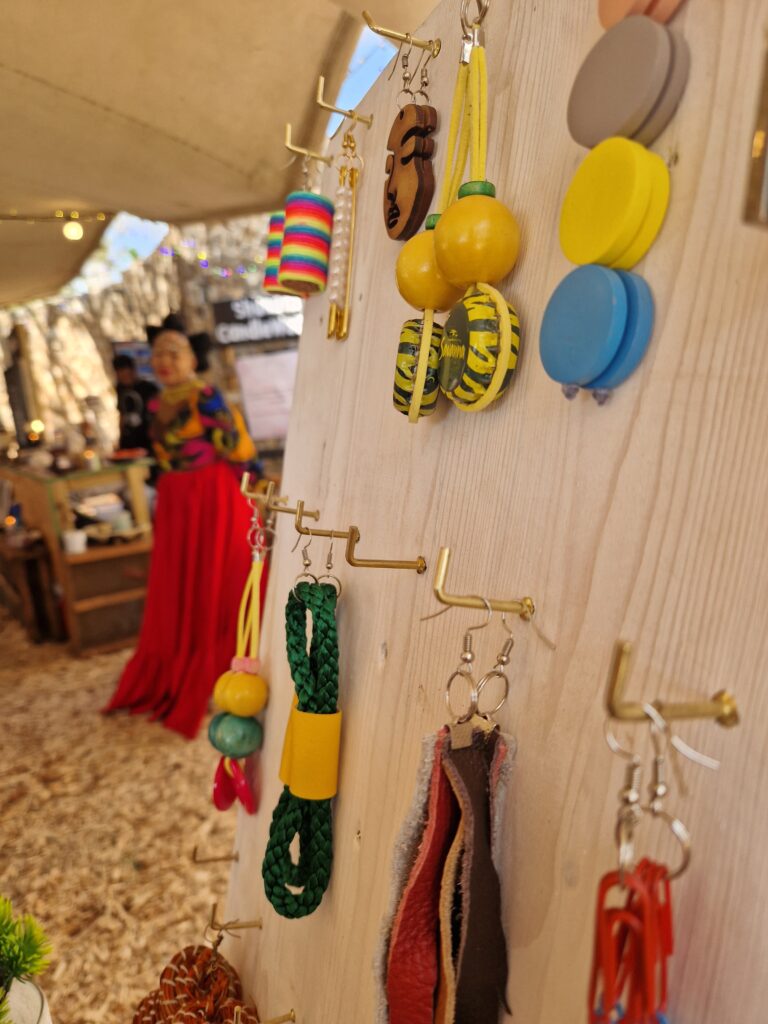
I walk a little bit further and am suddenly surrounded by portuguese. The festival has turned the amphitheater into a ‘taste of Mozambique’ and just outside, AZGO has set up stalls showcasing Mozambican artists and designers. “I know you!” somebody exclaims. I turn around and see Iracema Mabota, the founder and creator of Ririi Crochet. We had met earlier when I was in Tofo Mozambique.
I wonder how common crocheting is in Mozambique, turns out it was her mother that taught her initially. It makes me think of my own grandmother who once upon a time taught me how to crochet and knit.
If she was still with us today she would have loved one of Irma’s adorable crochet handbags, she always had an eye for good craftsmanship. It is beautiful how Luju seems to be such a fertile soil for new ideas to emerge and still hold space for what has been.
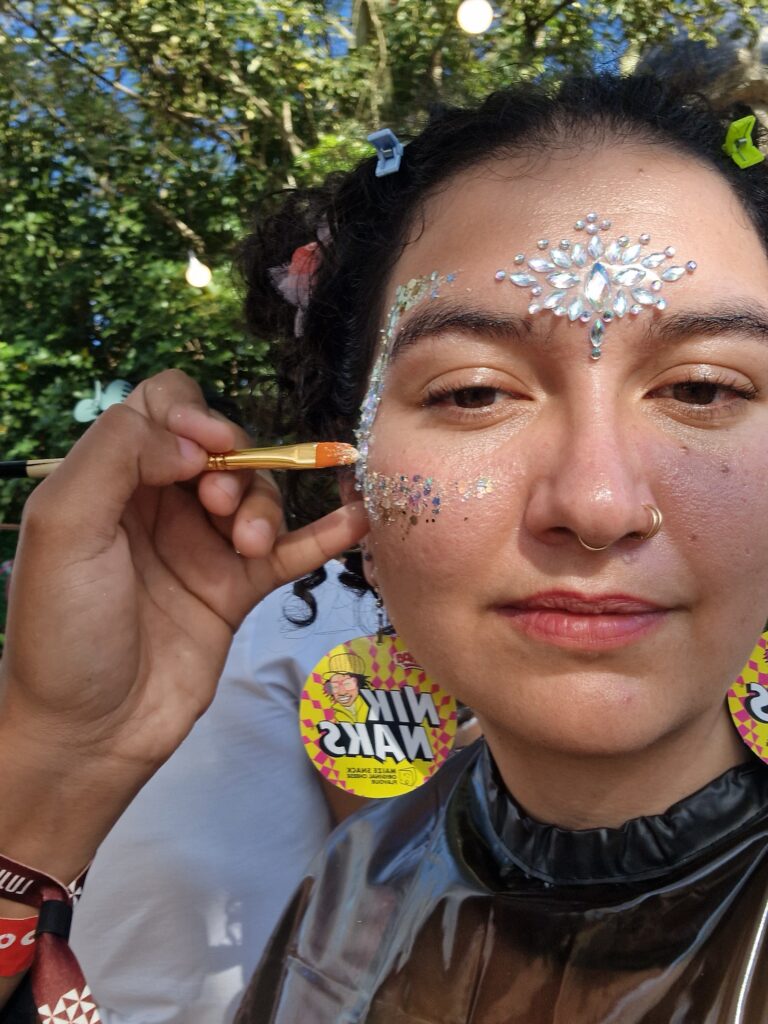
Heritage is especially a theme that comes to light when Chef Mokgadi is on stage. She is an activist chef who spreads indigenous knowledge of food and farming when she cooks and speaks. She was invited to Luju this year to hold a master class in cooking with indigenous food, her specialty. Throughout the class, she was feeding the audience with not only her knowledge but her enthusiasm as well. When we sit down together afterwards, the very energy and life that emanated from her on stage is still radiating through her. After talking for a while I notice, this energy is Chef Mokgadis constant base line.
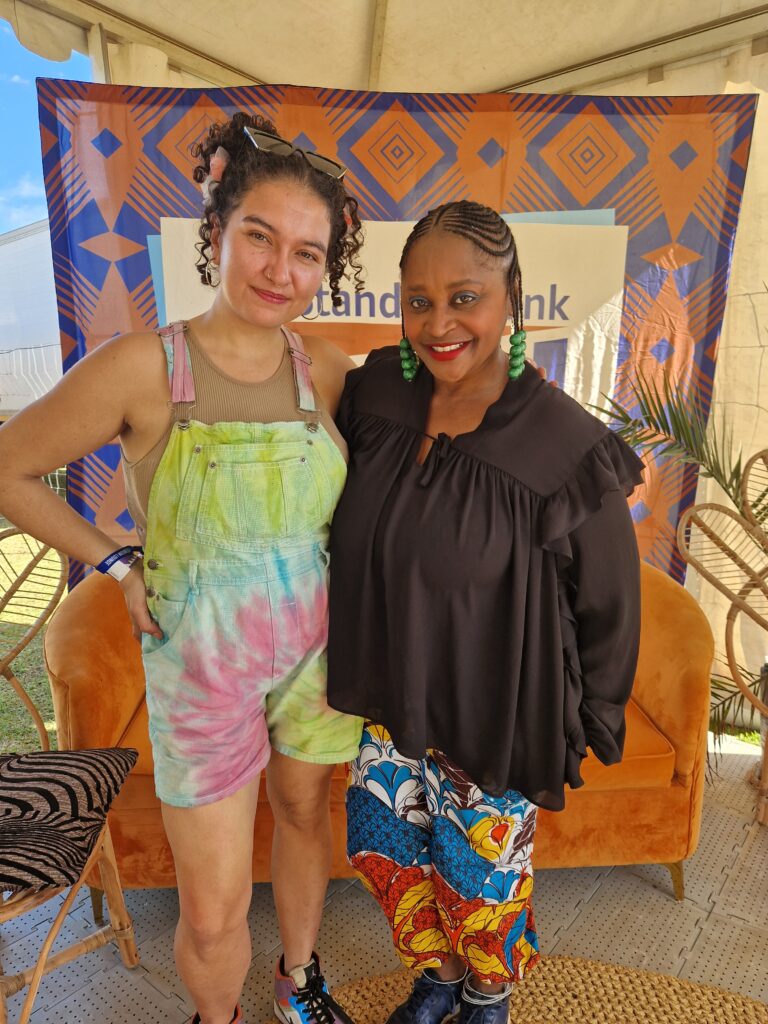
Interview with Chef Mokgadi Itsweng
It is Saturday afternoon and I am waiting nervously in the media tent. The sun is shining but not even half as bright as the smile of our next guest: Chef Mokgadi. We haven’t even sat down on the orange interview couch before the conversation is flowing. I have to ask her to hold her thoughts so that I can press play on the recorder. With a patient and warm smile she lets me get my things in order.
Chef Mokgadi started out as a food writer and editor before she released her first book Veggielicious in 2021. She comes from a family of cooks and farmers so ending up here was perhaps not surprising to her family. Not only is she inspiring people to eat more vegetarian food in the Country Of Meat (South Africa). But the way she does it; cooks, teaches and educates, is entirely her own. Chef Mokgadi is a food activist with a passion for uplifting women, life and food that is good for the soul!
What is the biggest difference between you today and who you were when you started out?
“People who know me, who have seen my work and where I come from, would say that the biggest difference now is my confidence. I’m not apologetic about what I do, I’m not explaining myself, I just do. Everything I do comes from an authentic self, it comes from a pure love of self and the love of black people, a love of humanity, a love of mother nature. So it all comes from love and the difference in me, then and now, is the confidence that this love has brought. Because I no longer apologize, I no longer explain, I just am. If you like it, take it or leave it. I have my message and I’m going to say it. I think that over the years I have grown, which is why I am so intentional around women. Because I, too, have had to fight some monsters along the way. And one monster was self confidence, not standing up for myself, being afraid to say no because you know ‘good girls don’t say no, good girls are people pleasers’… Now I’m like, No.”
"I stand on the broad shoulders of women." Chef Mokgadi
In what way are you intentional around women?
“My food and everything that holds my food is my granny’s food, my moms food, both my grandmothers. One of my grandmothers was an indigenous farmer and the other one was a chef. Both of them have influenced my food and the way I talk about food, how I cook, what I cook. It’s incredible that at this stage of my career, all I am meeting is women. My team is only women! My manager; my kitchen team when we take Gogo’s plate on the road; the farmers that I work with are women farmers; food producers are women producers; people I source from are mostly just women. For me, the voices of the women are what are going to heal us. We need to take care of the female energy on earth. Mother earth needs us. It is not papa earth or whatever. It is mother earth, the nurturer. We need to bring that back.”
She goes on to tell me how important it is to open up doors for other women. Through her current collaboration with Mugg & Bean she has been able to create opportunities for small, female farmers to sell their produce to one of South Africa’s biggest restaurant brands. A space that otherwise wouldn’t be easily opened to them.
Do you feel that you meet backlash in this industry?
“Yeah but I don’t care! Hahahah! I do what I feel is right but most importantly, I’m a food activist, my message needs to be heard and needs to come through from women.” Chef Mokgadi leans in a little, looks at me seriously and says.
“The food and restaurant business is very white in South Africa and also very male. So for me, this is intentional. My door was opened by a woman. My mentor, Dorah Sitole, literally kicked these doors open for me so that I can then open and hold the doors for others. I’m not gatekeeping any door – we have opened the doors now, can we all come in, you know? So that is where I am. I stand on the broad shoulders of women. That is who has inspired me, that is who has brought me here. And that’s who I work with!
What does it mean to you being a food activist?
“Waking up my community around their love for mother earth. Because what has happened is that humanity has separated from mother earth. We don’t grow our own food, everything comes in a plastic bag. We are so unconscious about where our food comes from and what we eat. So my message is always around consciousness, waking us up, we need mother nature and need to care for her. We might not see it because we are so boxed into our city life, being modern.
We are not grounded in reality, and for us to be able to help mother nature and help climate change, we need to be grounded in reality. Reality is that we can’t grow food properly, we don’t know how. We are not taking care of our rivers so how are we gonna be alive if our water sources are crying? The rivers, the oceans, they are all crying. And we don’t even see it! To us, the sea is here for us and we don’t understand that it doesn’t need us. Mother nature doesn’t need us, we need her. But a lot of us are still sleeping, we don’t realise we are not grounded.”
Today during your master class you talked about indigenous grains as a form of resistance to the industrial agricultural system, what does this mean?
“The industrial agriculture system is so toxic. I, like everyone in South Africa, grew up eating corn. I thought that was our staple. I didn’t understand that there was something before corn. Only through my grandmother, who was an indigenous farmer, did I learn. She used to grow sorghum amongst other indigenous grains. I got the green fingers from her but I also got the indigenous knowledge systems from her. Because of that, I understood that you can grow food that is delicious and healthy.
We all grew up eating corn but now the corn is GMO. The pesticide that they need to keep the GMO growing is hurting me. I can’t eat corn anymore, I get hives all over. My body is like NO. A lot of people will normalize being bloated and walk around with it thinking they are fine. But with hives, you can’t ignore them. The hives tell us to wake up! That was what happened to me all the way! I used to get bloated, runny tummies, etc. I should have said what’s wrong, let me investigate. But instead I covered it up and continued with my life. Only when I got hives on my face did I react.”
What do you feel is needed in this industry to actually make the change that you advocate?
“We need chefs that advocate. Chefs are the link between the people and the farmers. It is only when the chefs create those conversations that the change at home happens. You remember with quinoa, we all started eating quinoa because the chefs were telling us, it became a big thing – quinoa this and quinoa that! The chefs are the ones who carried the quinoa message to us, the home cooks, the moms, the health yogis and all that. That’s how I think the movement, the change, happens. Chefs need to be educated so that they can advocate for good food and for mother earth. Oh she is making risotto with sorghum, why? Only then, people will start making risotto with sorghum. People will understand that sorghum is better than rice because rice is not sustainable, it requires lots of water. Sorghum is healthier and our body knows it, our soul knows it.”
When we were finished with the interview and just chitchatting, Chef Mokgadi said something that really resonated with me. We were talking about following your path no matter other peoples opinions and reactions.
“Over the years I have learnt to really appreciate and understand who I am and love myself wholeheartedly and not care!” She laughs with her whole body.
“And also, I share it with others. And I find that it actually helps others to also break free from their own little box, their own little mould. Just be yourself, and the rest will fall into place. We have to be free and grounded. Grounded in authenticity, grounded in mother earth, so that you are able to make a change and be inspirational in your community.”
Her words put themselves like a warm blanket around me. So much wisdom had been shared in these short minutes on the orange couch. So much wisdom, warmth and laughter. Just like the women at the fashion café that I had spoken to earlier, Chef Mokgadi also uses her ancestral knowledge to create something new and completely enchanting. I feel inspired! What if this is what my life is supposed to be like now? I feel a thrill running through my entire body. I say thank you and bye to Chef Mokgadi with a little sting in my heart, I could have continued talking to her for hours! I make a note to myself to ensure I try her food the next time I am at Mugg & Bean.
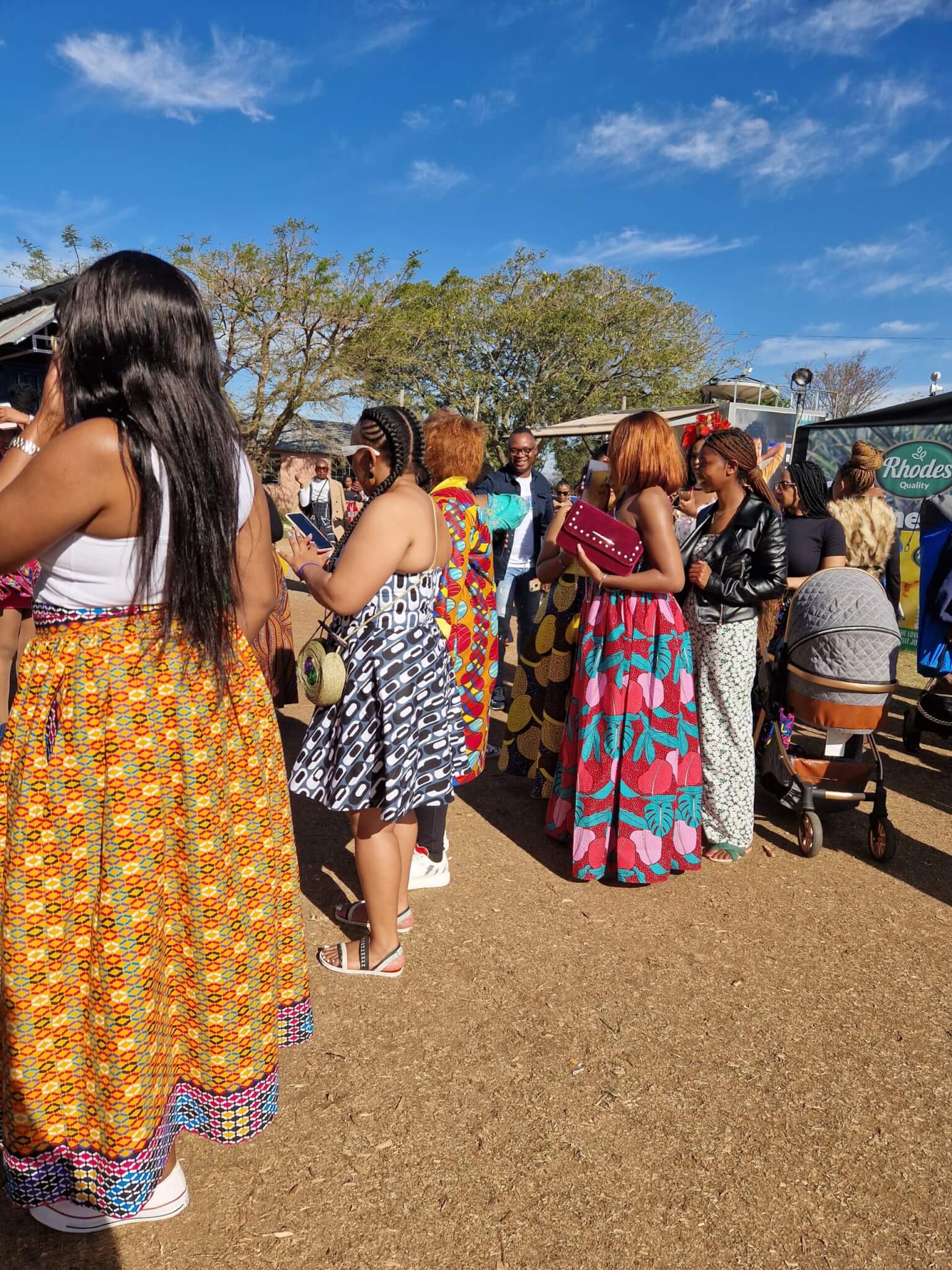
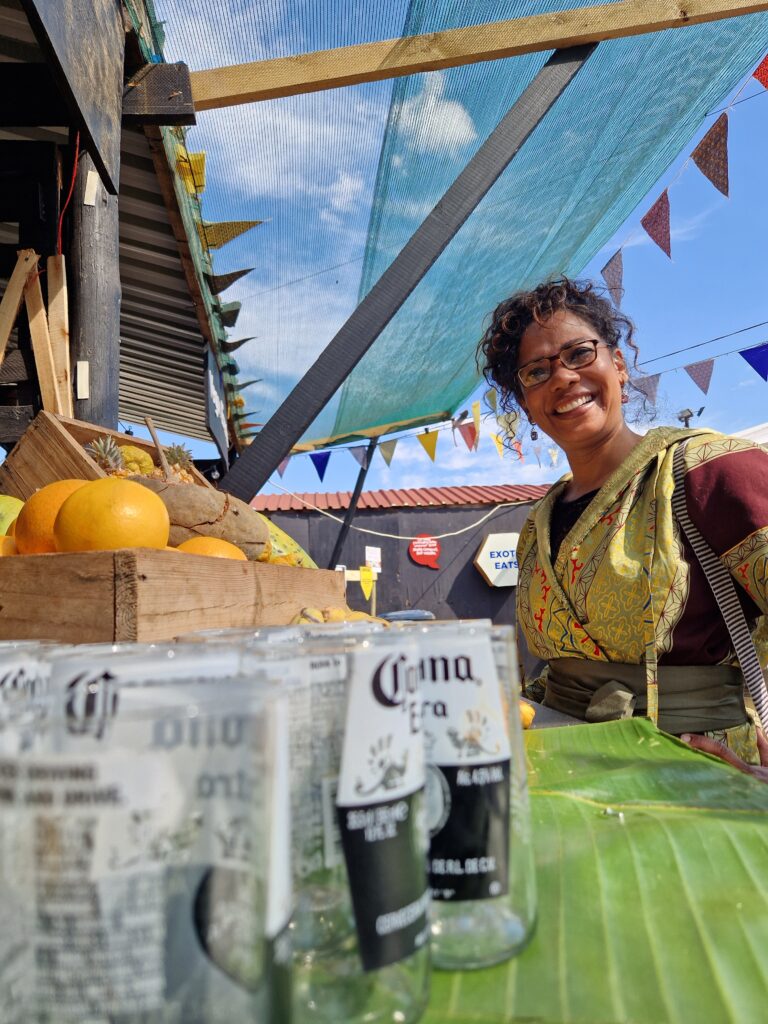
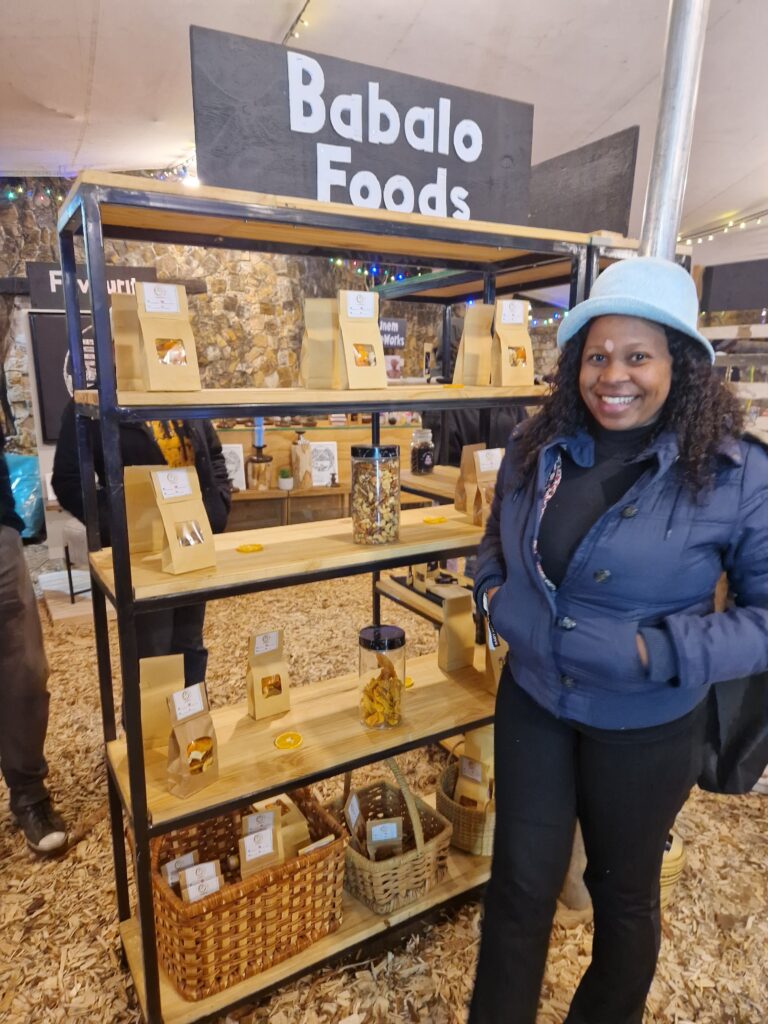
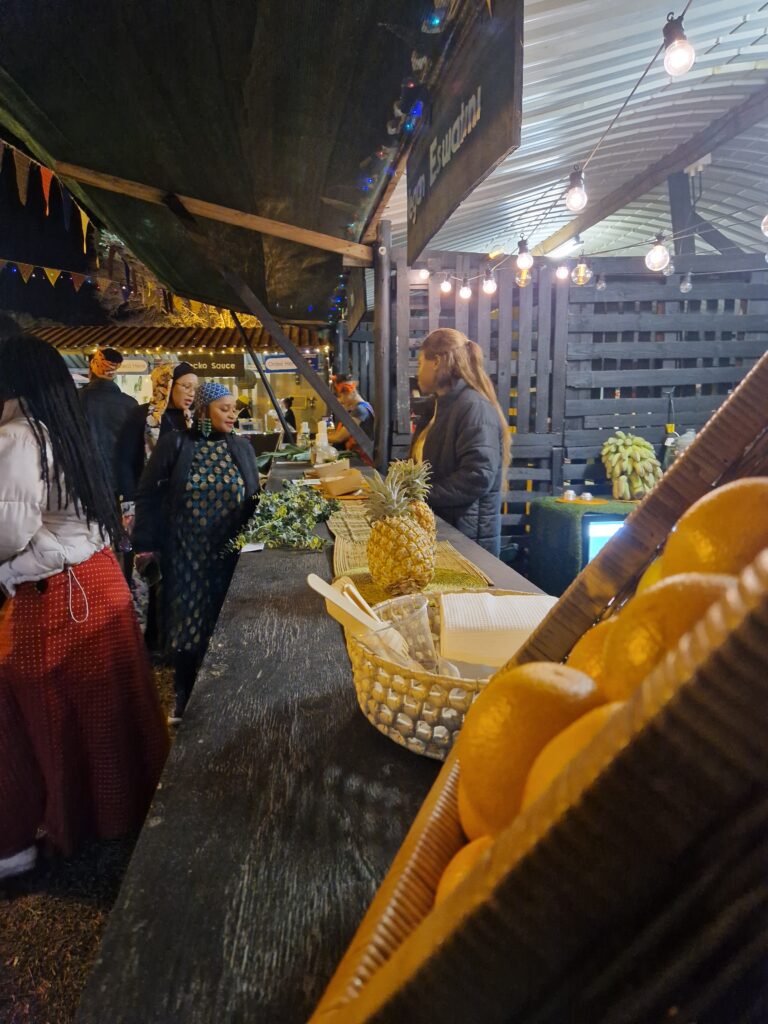
3 thoughts on “Fashion, food and resilience at Luju Festival”
Beautiful! I love every Word in the text. I so ageee with chef Mokgadi. Thank you 💗
How wonderful! It was so fun talking to someone so passionate and knowledgeable about what they do!
Pingback: The dreamers and weavers of Luju festival - The global entity